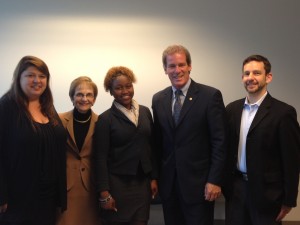 At a media briefing last Friday State Rep. Roger Goodman, D-Kirkland, along with former State Supreme Court Justice Bobbe Bridge, attorney Casey Trupin from Columbia Legal Services, the American Bar Association and foster youth highlighted the need for Washington State to provide legal representation for abused and neglected children as they move through the foster care system.
At a media briefing last Friday State Rep. Roger Goodman, D-Kirkland, along with former State Supreme Court Justice Bobbe Bridge, attorney Casey Trupin from Columbia Legal Services, the American Bar Association and foster youth highlighted the need for Washington State to provide legal representation for abused and neglected children as they move through the foster care system.
Rep. Goodman stressed the importance of foster youth having someone on their side, commenting, “These children bounce from house to house, from school to school, from neighborhood to neighborhood, not knowing what’s going on.
Everyone else has a lawyer to help them, and these vulnerable children have no one they can trust, no one to confide in so that their legal interests are protected.”
In most states all foster children have lawyers, but in Washington State they do not. Washington ranks 48th in the nation in the degree of legal representation offered to foster kids. Although we champion the rights of so many others, we do not give our most vulnerable youth the legal representation they need.
Everyone else in the courtroom has an attorney – except the child whose future is at stake. This isn’t fair.
Casey Trupin discussed how much faster a foster child will find a permanent home with an attorney on his or her side. Shortening the time a child is in the foster care system saves the child from avoidable trauma, medical costs and social and emotional problems.
In 2010 the State Legislature unanimously acknowledged that we have inconsistent practices among Washington counties and that attorneys will increase accountability within the foster care system.
A social worker is helpful but does not necessarily advocate for a child’s needs and cannot advise a child to his or her legal rights.
Furthermore, “guaranteeing that children have representation makes fiscal sense too,” asserted Rep. Goodman. He went on to explain, “The most troubled youth have difficult cases that take a long time.
And without a lawyer, permanency takes longer. Without a lawyer, the case will drag on – all at cost to the public.”
The advocates were joined by Zipporah, a shy but articulate foster child with a beautiful smile and an inspiring story. Having an attorney was the first time Zipporah had felt she had a voice in her life.
Katie, Zipporah’s attorney, helped keep Zipporah with a family nearby so she could stay in the same school, with her friends and in her community. Zipporah has vowed to be the first in her family to graduate from college.
When she felt like running away Katie was there to explain the consequences of Zipporah’s actions and how it would work against her goals.
In the 2013 legislative session Rep. Goodman has sponsored HB 1285, a bill establishing a right to counsel for the most troubled children in the foster care system.
The bill passed the House with overwhelming bipartisan support before getting caught up in the Senate. Rep. Goodman is optimistic that the bill will make it through to final enactment next year.
In the questions that followed the briefing it was posed, “If legal representation for foster children is so important, what are the barriers to ensuring it happens?”
In response, Justice Bobbe Bridge touched on a sensitive point. She said this goes back to the fundamental issue about whether children are human beings or whether they are property. If we believe children are human beings why should they not have a voice or in their future?
In a courtroom, everyone but the child whose future is at stake has an attorney. It’s not fair. Now is the right time for Washington to ensure that our most vulnerable children have representation. It’s the right thing to do.

